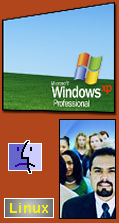|
Operating Systems
What is operating system?
The most important program that runs on a computer. Every
general-purpose computer must have an operating system
to run other programs. Operating systems perform basic
tasks, such as recognizing input from the keyboard, sending
output to the display screen, keeping track of files and
directories on the disk, and controlling peripheral devices
such as disk drives and printers.
For large systems, the operating system has even greater responsibilities and powers. It
is like a traffic cop it makes sure that different programs and users running at the same
time do not interfere with each other. The operating system is also responsible for security,
ensuring that unauthorized users do not access the system.
Operating systems can be classified as follows:
- multi-user : Allows two or more users to run programs at the same time. Some operating
systems permit hundreds or even thousands of concurrent users.
- multiprocessing : Supports running a program on more than one CPU.
- multitasking : Allows more than one program to run concurrently.
- multithreading : Allows different parts of a single program to run concurrently.
- real time: Responds to input instantly. General-purpose operating systems,
such as DOS and UNIX, are not real-time.
|
 |
|
